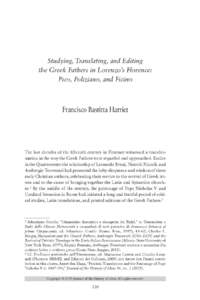Por favor, use este identificador para citar o enlazar este ítem:
https://repositorio.uca.edu.ar/handle/123456789/20069| Campo DC | Valor | Lengua/Idioma |
|---|---|---|
| dc.contributor.author | Bastitta Harriet, Francisco | es |
| dc.date.accessioned | 2025-07-10T14:21:46Z | - |
| dc.date.available | 2025-07-10T14:21:46Z | - |
| dc.date.issued | 2025 | - |
| dc.identifier.issn | 1086-3222 | - |
| dc.identifier.issn | 0022-5037 | - |
| dc.identifier.uri | https://repositorio.uca.edu.ar/handle/123456789/20069 | - |
| dc.description.abstract | as I will argue in this article, the rekindling of Greek patristics in Lorenzo de’ Medici’s intellectual circle evinced notably different motivations and circumstances, as well as a deeper cultural significance. The thorough training in ancient philosophical texts by Marsilio Ficino and his followers demanded a refined and speculative version of Christianity, sensitive both to the heights of metaphysical contemplation and to the beauty and elegance of style.3 Ficino’s engagement with the Greek Fathers progressed from the beginning of his studies of the Greek language under the auspices of Cosimo il Vecchio and through the years of Lorenzo’s regime. In this last period, he wrote some of his most important works, including De christiana religione, Theologia platonica, and his translation and commentary on part of the Corpus Dionysiacum. For Giovanni Pico della Mirandola, Greek patristics were even more important, providing fundamental guiding principles and methodological tools. As a result of Lorenzo’s industriousness—and his deep pockets—hundreds of new Greek manuscripts entered the libraries of the Medici and other members of Ficino’s circle, including numerous patristic sources hitherto unknown in the West. Following a brief presentation of the cultural context of Lorenzo’s Florence and its literary treasures, I will turn to the reception of the Greek Fathers in Marsilio Ficino, Poliziano, and Pico, to understand their aspirations, their mutual influences, and their differences. While Ficino primarily viewed the Fathers through the lens of their alignment with the Platonic tradition and Poliziano approached their works as a repository of classical references and eloquence, Pico pursued a more comprehensive engagement with the Greek Fathers, valuing their philosophical insights beyond the confines of Platonism and integrating their perspectives into his broader intellectual endeavors. | es |
| dc.format | application/pdf | es |
| dc.language.iso | eng | es |
| dc.publisher | University of Pennsylvania Press | es |
| dc.rights | Atribución-NoComercial-CompartirIgual 4.0 Internacional | * |
| dc.rights.uri | http://creativecommons.org/licenses/by-nc-sa/4.0/ | * |
| dc.source | Journal of the History of Ideas. 86(2), 2025. | es |
| dc.subject | LITERATURA GRIEGA | es |
| dc.subject | TRADUCCION LITERARIA | es |
| dc.subject | EDICION | es |
| dc.subject | Pico della Mirandola, Giovanni, 1463-1494 | es |
| dc.subject | Poliziano, Angelo, 1454-1494 | es |
| dc.subject | Ficino, Marsilio, 1433-1499 | es |
| dc.title | Studying, translating, and editing the greek fathers in Lorenzo’s Florence: Pico, Poliziano, and Ficino | es |
| dc.type | Artículo | es |
| dc.identifier.doi | 10.1353/jhi.2025.a959038 | - |
| uca.issnrd | 0 | es |
| uca.affiliation | Fil: Bastitta Harriet, Francisco. Pontificia Universidad Católica Argentina. Facultad de Filosofía y Letras; Argentina | es |
| uca.version | publishedVersion | es |
| item.languageiso639-1 | en | - |
| item.fulltext | With Fulltext | - |
| item.grantfulltext | mixedopen | - |
| Aparece en las colecciones: | Artículos | |
Ficheros en este ítem:
| Fichero | Descripción | Tamaño | Formato | Login |
|---|---|---|---|---|
| studying-translating-editing.pdf | 290,4 kB | Adobe PDF | SOLICITAR ACCESO | |
| studying-translating-editing.jpg | 182,13 kB | JPEG |  Visualizar/Abrir |
Este ítem está sujeto a una Licencia Creative Commons

